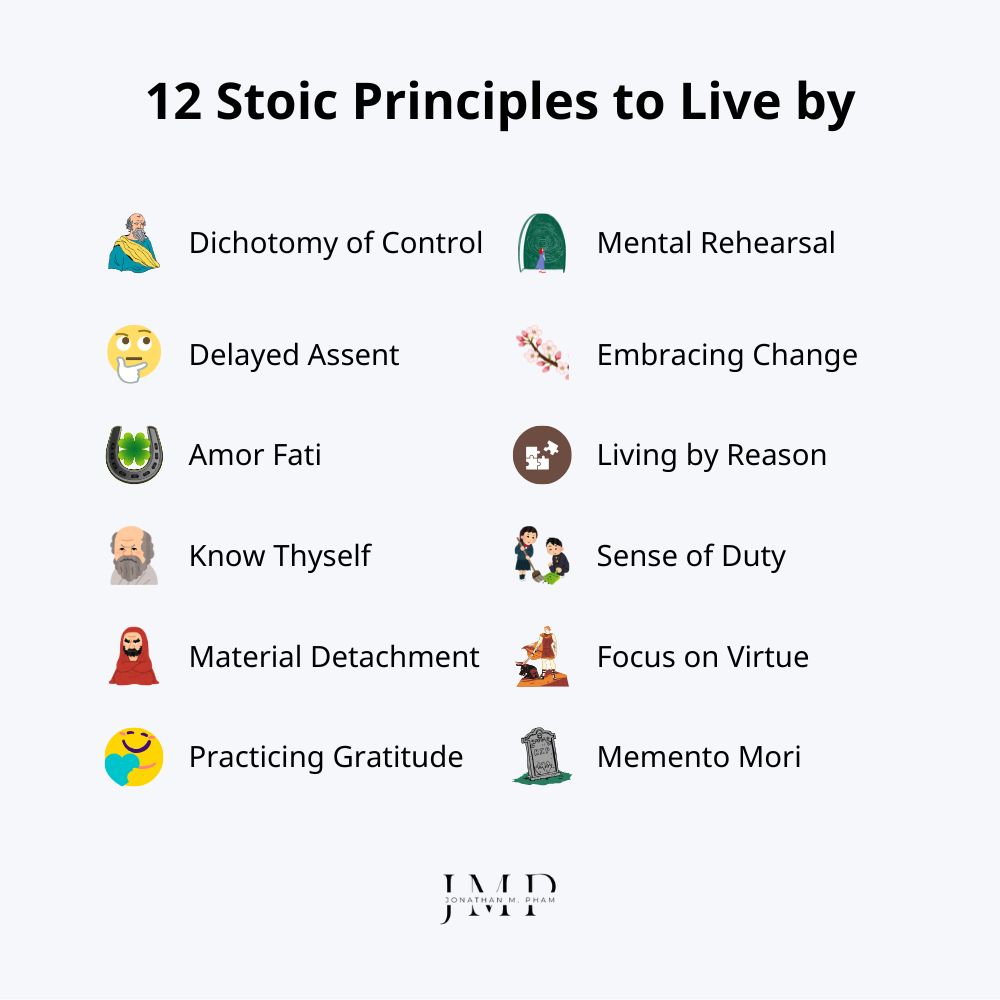12 ancient Stoic principles for finding peace, purpose, and resilience in today’s busy world!
In today’s fast-paced world, filled with constant notifications and pressure to achieve, Stoicism has emerged as a powerful philosophy for those seeking to navigate life’s complexities. Far from being a dusty relic of the past, the core Stoic principles remain surprisingly relevant, offering a practical guide for finding inner peace, purpose, and fulfillment even amidst the chaos.
Highlights
- Below, you will find a list of 12 Stoic principles such as controlling your reactions (Dichotomy of Control), delayed judgment (Delayed Assent), and accepting fate (Amor Fati). These guidelines are meant to cultivate one’s mental resilience and inner peace.
- Stoicism is about distinguishing between things you can control (your thoughts and actions) and things you can’t (external events). It highlights the pursuit of virtues like wisdom, courage, temperance, and justice as key to a meaningful life.
- Beyond the core principles, the article explores practices like self-reflection, gratitude, and negative visualization. It also includes a FAQ section to discuss Stoicism’s relevance in the modern world, recommend books for further study, and share inspiring quotes for those who would like to adopt this ideology into their life.
Dichotomy of Control
A cornerstone principle in Stoicism, the dichotomy of control is a philosophy focused on achieving inner peace and living virtuously. It essentially boils down to this: distinguishing between what you can control and what you can’t – and then focusing your energy on the former only.
- Internal (within your control): Your thoughts, judgments, desires, character, actions, and reactions to life events. These are all choices you are capable of making.
- External (outside your control): Everything else – external events, other people’s actions and opinions, the weather, the past, and ultimately, the outcome of your actions. You can’t decide or directly impact them.
By directing your energy toward your thoughts, judgments, and actions, you empower yourself to take charge of your own perspectives, and how you interpret situations/ react to them. This doesn’t mean ignoring external events – but rather not letting them dictate your emotions or actions.
According to Stoicism, our initial interpretations of events are often named “impressions.” They are (most of the time) automatic and driven by our biases – as such, they are the main fuel of negative emotions. That said, these impressions are actually within your control. You can use reason to challenge them, reframe situations, and adopt a more positive/ productive interpretation.
How-to tips:
- Ask “Can I control this?”: When faced with a challenge, ask yourself if it’s something you are capable of directly influencing. Otherwise, accept it and focus on what is within your reach (your response).
- Focus on your actions/ reactions: Since your thoughts and actions are within your control, invest your energy in adopting virtuous responses and acting with integrity.
- Cognitive reframing: Challenge negative thoughts with more realistic or positive interpretations.
- Think process, not outcome: Often, the result of our actions is influenced by external factors. As such, the first Stoic principle is about focusing on the effort and virtue applied in the process, not just the desired outcome.
- Live in the present: Dwelling on the past or worrying about the future is a waste of time – as what has happened/ is about to happen is outside your control. Instead, investing your energy into the present moment and the actions you can take now is a much wiser choice.
Examples:
- Traffic jam: The traffic is not something you are able to decide for yourself – however, you still can manage how you react to it. Listening to calming music, practicing deep breathing, or leveraging this “dead” time to plan your day are much better courses of action compared to groaning or moaning.
- Criticism: You receive harsh criticism at work (external). Despite your frustration, what another person says is up to them – the best you can do is to focus on your interpretation of the message. Is it valid feedback or just someone else’s issue? Is there some truth to it? Are there any valuable lessons that you can extract from those harsh words?
- Being cut in line: If someone cuts in line, your initial impression might be “They’re a jerk!”. That said, it might be better to remind yourself that you don’t know their situation – and that getting angry won’t make you move faster.
- Healthy living: Despite our best efforts to keep in shape, we all get sick from time to time. However, while you can’t decide whether to become ill or not, you are still able to consider your daily routine and decide if it’s possible to adopt more healthy habits/ get rid of destructive ones.
Accepting what’s outside your control doesn’t mean resignation. It means acknowledging reality and focusing on what you are ACTUALLY able to do.

Stoic principles
Delayed Assent
Delayed assent is a powerful Stoic principle that promotes critical thinking and emotional control. It essentially advocates for pausing before reacting to information or events, and carefully evaluating them before forming beliefs or judgments.
Our brains are wired to react quickly to information – and are often fueled by emotions (many of which are not so rational). Stoicism encourages us to take a step back and analyze the situation before accepting it as truth. By pausing to consider the source, potential biases, and the bigger picture, we give ourselves the chance to prevent impulsive decisions or emotional responses that we might later regret.
Delayed assent is about acknowledging uncertainty – that we usually don’t have all the necessary facts and therefore should suspend judgment until we do.
How-to tips:
- The 5 whys: Upon encountering a new piece of information, ask yourself “Why” 5 times. This helps you dig deeper and understand the underlying reasons and motivations. Challenge yourself to seek more details and context before arriving at conclusions.
- Consider the source: Evaluate the credibility of the information source. Are they experts? Do they have a hidden agenda?
- Develop a “beginner’s mind”: Approach everything with curiosity and a willingness to learn, not with preconceived notions.
- Logic and reason: Apply critical thinking to analyze the information in an objective light. Does the evidence support the conclusion?
- Fact-check: In today’s digitalized world, it is a recommended practice to verify everything you come across with various reliable sources before accepting it as fact.
- Use the “maybe” method: Instead of jumping to “yes” or “no,” acknowledge the uncertainty by saying, “Maybe, but I need more information.”
Examples:
- Social media news: Before getting outraged over a social media post, pause and consider whether it can be trusted – and if there are potential biases you should be aware of. Check for factual evidence before sharing.
- A heated argument: In a disagreement, take a moment to listen to the other person’s perspective before reacting defensively.
- Making a big decision: Don’t rush into important choices. Gather information, weigh the pros and cons, and consider potential consequences before committing.
Delayed assent doesn’t equal chronic skepticism. Rather, it prompts us to form well-considered beliefs based on evidence and reason – while constantly being open to new information that might challenge your existing viewpoints. In the current information age, a questioning mind has become more crucial than ever.

Stoic principles
Amor Fati
Amor Fati, a Latin phrase translating to “love of fate,” is a powerful Stoic principle that encourages the wholehearted acceptance of everything that happens in life, good or bad. It’s not about blind passivity, but about recognizing that some things are outside our control – hence, the best course of action is to focus on our response to them. In other words, we need to acknowledge what we can’t change and choose to find meaning and growth within those circumstances.
The principle of Amor Fati encourages us to shift the inner dialogue from “Why is this happening to me?” to “What can I learn from this?“
The Stoics believed in a larger cosmic order – where everything is interconneted, even if we can’t always understand it. As such, we need to trust that every life incident ultimately serves a higher purpose. By embracing adversity, we give ourselves the chance to develop strength, resilience, and a deeper appreciation for life’s joys.
How-to tips:
- Reframe challenges: View challenges as opportunities to learn and grow. Ask yourself “What can I gain from this experience?”
- Focus on controllables: While you can’t control external events, you can decide how you choose to respond to them.
- Stoic meditations: Regularly reflect on the impermanence of life and the importance of directing resources toward what truly matters.
Examples:
- Job loss: Instead of dwelling on the negative aspects, take advantage of the experience to develop new skills, explore different career paths, or spend more time with family.
- Illness: Getting sick means you now have the chance to appreciate your health and focus on what truly matters in life. Additionally, it is also an opportunity to practice patience and acceptance.
- Unexpected delays: Use the extra time to read, meditate, or simply be more mindful.
Amor Fati doesn’t mean giving up on your goals. In fact, you can still strive for a better future while accepting the present. You learn to see life’s tapestry as a whole, appreciating both the light and dark threads that weave its unique design.

Stoic principles
Practicing Self-reflection, Mindfulness, and Awareness
The phrase “know thyself” is a cornerstone of Stoicism; it emphasizes the importance of understanding yourself to live a purposeful and virtuous life. By regularly examining your thoughts, feelings, and reactions, you gain a deeper understanding of your motivations, biases, and triggers – which empowers you to make informed choices, manage emotions effectively, and respond to situations with reason rather than impulse.
How-to tips:
- Schedule time for reflection: Dedicate time each day (even 5 minutes should suffice) for quiet reflection on what has happened within the day. Were there situations you could have handled differently? What can you learn from them?
- Journaling: Write down what’s bothering you. Analyze if it falls under your control. If not, reframe it or brainstorm practical solutions that can be implemented soon. Aside from gleaning into your emotional patterns and thought processes, journaling is also an amazing way to track progress toward your goals and identify areas for improvement.
- Ask powerful questions: Prompt yourself with questions like “What triggered that emotion?” or “What could I have done differently?”
- Practice mindfulness: Engage in activities that cultivate present-moment awareness, like meditation, deep breathing exercises, or spending time in nature. Through these practices, you learn to observe your inner states without judgment – as well as to detach from negative thought patterns and cultivate a sense of calm amidst life’s uncertainties.
- Stoic texts: Read and reflect on Stoic texts that discuss the importance of self-awareness and objective thinking.
Self-reflection often involves confronting our shortcomings. We need to learn to embrace vulnerability as an opportunity for growth – instead of being inhibited and critical toward ourselves. If you find the process too challenging, consider seeking guidance from a therapist, coach, or counselor.
Read more: 20 Stoic Questions for Daily Reflection & Growth
Detachment From Material Possession
Stoic principles emphasize that true happiness and fulfillment come from within, not from without. Detachment from material possessions means placing less importance on material objects that often lose their appeal over time – and instead focusing on cultivating inner virtues and experiences. By spending time with loved ones, traveling, or learning new skills, we give ourselves the chance to create lasting memories and contribute to personal growth.
The Stoics believed in using possessions for their intended purpose, not accumulating them for show. Owning what you need and making good use of it is preferable to being plagued with an abundance of things that will eventually clutter your life.
Detachment doesn’t mean living in poverty or becoming so emotionless that we completely reject material possessions. Rather, it encourages us to only acquire what we truly need and appreciate the value of those things. By simplifying our lives and attaining a healthy balance, we can free up time, resources, and mental space to pursue what truly matters to us.
How-to tips:
- Identify your values: Understanding what truly matters to you – so as to distinguish between needs and wants.
- Enjoy what you have: Appreciate the things you have been given in life without letting them define your happiness.
- Declutter regularly: Regularly declutter your physical space, by getting rid of unused items and keeping only those that bring you joy or serve a purpose.
- Focus on experiences: Budget for experiences like travel, classes, or concerts instead of just material goods.
- Challenge consumerism: Be mindful of marketing or sales tactics that exploit desires and create a sense of artificial lack/ urgency. Ask yourself if a purchase aligns with your values and will bring you lasting satisfaction.
Examples:
- Choosing experiences over material gifts: Opt for a weekend getaway with friends over buying the latest gadget.
- Refusing impulse purchases: Before making a purchase, pause for a moment to decide if you truly need the item – and what value it will add to your life.
- Upgrading your phone: Before buying the latest phone, consider if your current one still functions well. Could the money be better spent on an experience or personal development course?
- Minimalism: Embrace a minimalist lifestyle, focusing on quality over quantity and prioritizing experiences.
- Sharing instead of owning: Consider borrowing or renting certain items instead of buying them outright, especially for infrequent use.
Being a Stoic does not not equate with renouncing all material things; rather, one learns the importance of prioritizing the inner world – their character, values, and relationships – over fleeting pleasures derived from possessions, which are temporary and ultimately outside their control.

Stoic principles
Practicing Gratitude
A cornerstone of Stoic philosophy, gratitude is more than just saying “thank you.” Rather, it involves the practice of consciously counting your blessings, big or small. By appreciating the seemingly trivial things in life – good health, loving relationships, beautiful sunsets – one may cultivate a positive outlook and find fulfillment regardless of external circumstances.
Shifting the focus from what you lack to what you do have cultivates a sense of abundance and contentment, while reducing feelings of envy or dissatisfaction. As such, it gives you the strength necessary to persevere through hardships.
How-to tips:
- Gratitude journaling: Daily or weekly, write down 3 things you are grateful for (e.g. “I’m grateful for my health and the ability to experience life fully” or “I’m thankful for the support of my family and friends”). If possible, ask yourself “Why am I grateful for this?” – so as to delve deeper and uncover the true value of what you have.
- The “gratitude walk”: During a walk, make a conscious effort to appreciate things you encounter along the way – nature, friendly faces, or even a comfortable breeze.
- The “gratitude jar”: Write down things you’re thankful for on small pieces of paper and keep them in a jar. On challenging days, draw a note and reflect on the positivity that radiates from it.
- Express gratitude: Verbally express appreciation to the people in your life who have posed a positive impact on you.
Examples:
- Appreciating health: After overcoming an illness, actively express gratitude for your regained health and the ability to perform everyday activities.
- Being thankful for relationships: Write a heartfelt note to a loved one and tell them how much their presence and support mean to you.
- Finding joy in the simple things: While sipping your morning coffee, pause to savor the warmth, the aroma, and the simple pleasure it brings.
It’s worth mentioning that gratitude has been observed to breed more gratitude. The more you focus on what you’re grateful for, the more you’ll find to appreciate in your life – this gives rise to a positive feedback loop that facilitates ongoing self-improvement.
Read more: Law of Attraction – Tips for Manifesting Abundance and Success in Life

Stoic principles
Negative Visualization
The practice of deliberately thinking about potential negative events that could happen in your life – named “negative visualization” or “premeditatio malorum” in Latin – might seem counterintuitive at first. However, its purpose isn’t to dwell on negativity – but to remind us of mentally rehearsing for challenges, building resilience, and appreciating what we have now.
The unknown is often a source of anxiety. By contemplating potential misfortunes, you demystify them and lessen their power to frighten you. As such, when they actually occur, the shock is lessened, and you’re better prepared to cope. The practice can be compared to mental fire drills – preparing yourself for the possibility of a negative event helps you stay calm and collected if it ever happens.
One amazing benefit of negative visualization is that it prompts you to appreciate the good things in life that you might otherwise take for granted. Specifically, by imagining losing your health, strong relationships, or financial security, you gain a deeper appreciation for their value. At the same time, adopting this Stoic principle also encourages you to develop contingency plans. For example, imagining losing your job might motivate you to update your resume or acquire new skills to improve employability.
By acknowledging the impermanence of good fortune, you learn to savor the present moment.
How-to tips:
- Start small: Don’t overwhelm yourself. Begin by visualizing minor inconveniences like a missed flight or a flat tire.
- Focus on specific scenarios: Instead of vague worries, identify specific potential challenges relevant to your current situation (e.g., job interview, public presentation).
- Maintain perspective: Remember that negative visualization is a mental exercise, not a prophecy. In other words, do not be too obsessed with worst-case scenarios.
- Balance it with a positive, action-oriented mindset: While visualizing, consider aspects within your control. For instance, when you imagine losing your current job, think about the specific competencies you can leverage to find a new one.
- Visualize your response: Don’t just imagine the negative event. Imagine yourself responding calmly and effectively, using your skills and virtues to overcome the obstacle.
- Set a time limit: Schedule a specific time for the exercise. Don’t let it dominate your thoughts throughout the day.
- End on a positive note: After visualizing challenges, conclude by reflecting on your strengths and resources to navigate them.
- Voluntary discomfort: Stoics practiced enduring discomfort (like cold showers or simple meals) to build resilience and mental fortitude. You can try immersing in such experiences from time to time (just remember to be moderated and not too obsessed with inflicting pain upon yourself).
Examples:
- Visualizing illness: Imagine being sick. Consider how you would manage your daily tasks – as well as the support system you have in place.
- Losing a loved one: While this might be a difficult experience, consider the positive memories you share with them and how you would cope with such a loss.
- Financial difficulties: Think about your budgeting skills and potential solutions to get back on track in case you ever face financial challenges.
Negative visualization isn’t any kind of fortune telling or predicting the future – it’s about mental preparation. Don’t dwell on the negative emotions; instead, focus on how you would react and the steps you would take – and balance it with gratitude and positive affirmations.
As a side note, for those who find themselves constantly getting anxious as they follow this Stoic principle, it may be wise to consider alternative practices like gratitude exercises.

Stoic principles
Embracing the Inevitability of Change
Nothing is permanent, except change.
Buddha
Life is like a flowing river – constantly moving and taking on new faces. We must see ourselves as part of this flow, not separate from it. By accepting change as a natural part of life, we reduce anxiety and frustration – while becoming more adaptable to new circumstances. On the other hand, clinging to the idea of permanence will only lead to suffering.
Despite their disruptiveness, new experiences often present opportunities for growth and learning. Embracing change means that we open ourselves to new experiences, skills, and perspectives that enrich our lives.
How-to tips:
- Develop flexibility: Cultivate the willingness to adjust your plans and expectations when circumstances change.
- Practice letting go: Learn to let go of the past and attachments to how things “should be.” This allows you to embrace the present and navigate disruptions more effectively.
- Allow yourself to feel: It’s okay to experience negative emotions during change. Suppressing them will only hinder your ability to adapt. Instead, acknowledge your feelings and allow yourself to process them healthily.
- Find comfort in routines: While embracing change, it’s okay to have routines and rituals that provide you with a sense of stability. For example, even if your schedule becomes too tight, do your best to maintain the practice of daily meditation to strengthen your focus and mental discipline.
- Seek support: Surround yourself with supportive friends, coaches, or mentors who can help you navigate change and offer encouragement during challenging times.
Examples:
- Career change: If you face an unexpected layoff, view it as an opportunity to explore a new career path you’ve always been interested in.
- Moving to a new city: Embrace the excitement of new experiences, meeting new people, and exploring a different environment.
- Loss of connections: Accept that relationships evolve over time – and that such an evolution presents the chance to deepen your connection or move on to healthier ones.
The wind does not break a tree that bends. Be as strong as iron when you must, but never inflexible.
Christa Wick
Living by Reason
Another cornerstone Stoic principle, living by reason involves the use of logic and clear thinking to guide your thoughts, emotions, and actions. In doing so, not only may we navigate life’s uncertainties with more clarity, but we also reduce the risk of being ruled by impulsive emotions or external pressures.
Emotions are a natural part of being human; however, they can become too powerful and therefore lead us astray from time to time. Stoicism teaches us to use reason to manage our feelings, instead of being controlled by them. By taking a step back and analyzing the situation rationally before reacting, one may make more thoughtful decisions and avoid regretful actions fueled by strong impulses.
How-to tips:
- Identify the triggers: Become aware of your emotional triggers and how they affect your thinking. By understanding the source of emotions, you are better equipped to prevent them from dictating your behavior.
- Ask “Why?”: Before reacting or forming an opinion, ask yourself “Why am I thinking this?” or “What evidence supports this belief?”
- Seek multiple perspectives: Reasoning relies on accurate information. Therefore, don’t rely on a single reference – instead, look for different viewpoints to get a more complete picture, especially those that contradict your assumption.
- Make learning a lifelong quest: Continuously strive to learn and expand your knowledge base. The more you know, the better equipped you are to reason effectively.
Examples:
- Feeling angry: If you ever get angered by what another person says/ does, take a moment to analyze the situation rationally and think about why you’re feeling that way. Is it a valid reaction, or is it being fueled by a misunderstanding or personal bias? Consider the other person’s perspective and identify a calm and productive way to address the issue.
- Making a big decision: When faced with a major life choice, weigh the pros and cons rationally based on facts and logic, not just emotions or external pressures.
- Dealing with negative news: Before reacting to negative news, take a moment to verify its source and consider its implications with a clear and objective mind.
Reason doesn’t mean suppressing emotions. Rather, one learns to manage the latter with the power of their own will.

Stoic principles
Sense of Duty and Responsibility
This Stoic principle emphasizes the importance of fulfilling the obligations to yourself, your loved ones, and society as a whole. It’s not about blind obedience, but about understanding your role in the world, acting with purpose and integrity, and caring for the common good.
Stoicism views humans as social creatures who thrive in communities. As such, we are inherently entrusted with the responsibility to contribute to the well-being of the communities we belong to – by being a good parent, a reliable friend, or a responsible citizen. Depending on the specific life circumstances, your responsibility may vary (and so do your unique skills and contributions). For example, a doctor might feel a duty to care for the sick, while a teacher might be called to educate future generations.
Your duty isn’t limited to grand gestures. It can involve anything – fulfilling your responsibilities at work, caring for your family, or simply being a kind and responsible citizen.
How-to tips:
- Self-reflection: Reflect on your values and strengths. What skills can you contribute to society?
- Identify your circles: Consider your concentric circles of responsibility – your family, community, country, etc. What duties do you have in each circle?
- Start from the basics: You don’t have to change the world overnight. Instead, fulfill your immediate obligations and gradually expand your reach later. Do not think too much about the actions of others (which are obviously out of your control) – rather, just focus on your own doings and their impact.
- Seek volunteer opportunities: Look for the chance to contribute your time or skills to causes you care about. At the same time, make sure not to neglect your own well-being.
- Advocate for what is right: Stoic duty is intertwined with justice. While respecting authority, we are also encouraged to speak out against injustice or unfair treatment in case we ever witness it – no matter how uncomfortable we may feel.
Be the change you wish to see in the world.
Mahatma Gandhi
Focus on Virtue
Virtue is viewed as the foundation for a meaningful and flourishing life. Stoic principles identify 4 cardinal virtues – wisdom, courage, justice, and temperance – as essential components of a framework for ethical conduct and personal growth.
Wisdom (phronesis)
- Description: Sound judgment, the ability to discern good from bad and make wise choices.
- How to practice: Seek knowledge and understanding, consider different perspectives, and practice delayed assent before forming beliefs.
- Examples of real-life applications: Before making a major financial decision, research thoroughly, weigh the risks and benefits, and consult with a financial advisor.
Courage (andreia)
- Description: Facing fear and difficulty with resilience and bravery, standing up for what is right.
- How to practice: Challenge your comfort zone, confront your fears in a measured way, and develop mental fortitude through practices like stoic meditations.
- Examples of real-life applications: Speak up against injustice, even if it’s uncomfortable.
Temperance (sophrosyne)
- Description: Self-control, moderation, and avoiding extremes in emotions and desires.
- How to practice: Practice mindfulness to understand your triggers, cultivate delayed gratification, and develop healthy habits.
- Examples of real-life applications: Instead of indulging in unhealthy cravings, practice portion control and choose healthier alternatives.
Justice (dikaiosyne)
- Description: Fairness, acting with integrity, and giving everyone their due.
- How to practice: Treat others with respect, be honest in your dealings, and strive to uphold a just and equitable society.
- Examples of real-life applications: Return a lost wallet to its owner, even if it contains a large sum of money.
The above-mentioned virtues are interconnected – in other words, developing one will inevitably strengthen the others. By focusing on honing these qualities, one may establish a strong moral compass and inner peace, leading to true happiness.
Memento Mori
Memento Mori, a Latin phrase translating to “remember you must die,” might seem like a morbid reminder. But in Stoicism, it’s a powerful tool for living a more fulfilling life. As mentioned in the previous principles, it’s not about dwelling on death – but about embracing life’s impermanence to prioritize what truly matters.
Our time in this world is not endless; hence, we should savor life’s experiences, both big and small – as well as focus on what truly matters (e.g. relationships, values, personal growth) while letting go of trivialities and fleeting desires. In other words, one needs to prioritize meaning over materialism.

Stoic principles
How-to tips:
- Daily contemplation: Take a few minutes each day to reflect on your mortality. Consider what you want to achieve and how you want to spend your time.
- Live intentionally: Examine your life goals and aspirations. Make conscious choices in which your actions are aligned with your core values, and take immediate steps instead of succumbing to procrastination.
- Visualize your eulogy: Imagine what you would want to be written on your tombstone – what you would want others to talk about your life. This should help identify areas where you want to make changes.
Examples:
- Spending time with loved ones: Instead of postponing quality time with loved ones, make it a priority, recognizing that these moments are precious.
- Pursuing a dream: The awareness of mortality should motivate you to pursue a long-held dream, encouraging you not to let life pass by.
- Letting go of grudges: Forgive and let go of negativity. Life is too short, so focus on positive and meaningful relationships.
Memento Mori isn’t about living in fear of death, but about appreciating life’s preciousness. It is a life-affirming practice that encourages you to live more fully and authentically.

12 Stoic principles to live by
Read more: Life Management – How to Design a Life You Love
Beyond Principles
What is Stoicism?
Stoicism is a philosophy that originated in ancient Greece around 300 BC. It emphasizes living a virtuous life by following reason and logic – and is based on the following tenets:
- Virtue is the only good.
- Dichotomy of control.
- Live in accordance with nature.
- Love of fate.
Some of the major philosophers who promoted this ideology include:
- Seneca – A Roman statesman and playwright who wrote extensively on ethics.
- Epictetus – A Greek philosopher who was a slave for much of his life. He taught the importance of inner freedom and focusing on what you can control.
- Marcus Aurelius – Roman emperor famous for his personal writings, “Meditations.”
The value of Stoicism in the modern world
Stoicism’s ancient wisdom holds surprising relevance in our fast-paced modern era:
- Reduced stress and anxiety: In a world filled with constant stimuli and pressure to achieve, Stoicism’s focus on what you can control allows you to let go of worries about external factors – which should significantly contribute to reducing stress and anxiety.
- Improved emotional resilience: Stoicism teaches you to acknowledge your emotions but not be ruled by them. By understanding the “Dichotomy of Control,” one may learn to react to situations thoughtfully rather than impulsively.
- Finding meaning and purpose: Focusing on core values like justice, courage, and wisdom gives your life meaning and purpose beyond external validation or chasing fleeting pleasures.
- Improved relationships: Stoic principles like empathy and acting with justice are extremely helpful in the process of building stronger, more meaningful relationships.
- Better decision-making: By prioritizing reason and logic over emotions, one may come up with clearer, more rational decisions, especially during challenging times.
- Perspective in a chaotic world: Given the ever-changing nature of the modern world, Stoicism’s emphasis on accepting what cannot be controlled allows you to maintain perspective and inner peace amidst external chaos.
Read more: Ikigai (生き甲斐) – The Blueprint for a Purposeful & Fulfilling Life

Stoic principles books
- Meditations by Marcus Aurelius
The book offers a unique glimpse into the mind of a powerful ruler grappling with Stoic principles. With insights into self-discipline, dealing with adversity, and living a virtuous life, it is a great fit for those interested in applying Stoicism to everyday challenges – particularly people in leadership roles.
- Letters From a Stoic by Seneca the Younger
A practical and engaging guide that offers advice on topics like managing emotions, wealth, and relationships. Thanks to its conversational style, many have found the book’s content relatable to various aspects of life.
- Discourses and Selected Writings by Epictetus
A foundational text for Stoicism, Epictetus’ work outlines many core Stoic principles that we have listed above.
- The Inner Citadel by Pierre Hadot
Hadot’s work provides historical context for Marcus Aurelius’ Meditations and explains Stoic practices like “negative visualization.” It offers readers with a fresh perspective on how to interpret the text.
- Philosophy as a Way of Life by Pierre Hadot
Another book by Hadot, this one broadens readers’ understanding of Stoicism by placing it within the larger context of Western philosophy’s focus on living a good life. It explores how philosophy can be a practical guide for self-improvement.
- The Daily Stoic by Ryan Holiday and Stephen Hanselman
A daily devotional offering bite-sized Stoic wisdom and exercises for year-round practice. It is great for beginners or those who want a structured approach to learning about the ideology.
Stoicism quotes
Waste no more time arguing what a good man should be. Be one.
Marcus Aurelius
We are more often frightened than hurt; and we suffer more in imagination than in reality.
Seneca
It’s not what happens to you, but how you react to it that matters.
Epictetus
Check out more Stoic quotes here!

Stoic principles
Final Thoughts
Stoicism doesn’t promise a life free from challenges; rather, it equips you with the tools to face them with greater strength, perspective, and acceptance. By incorporating the above-mentioned Stoic principles into the daily routine, you can start cultivating a sense of inner calm, building stronger relationships, and approaching life’s inevitable setbacks with a newfound sense of resilience. So, take a deep breath, embrace the present moment, and embark on your own journey toward a more meaningful and fulfilling existence!
Other resources you might be interested in:
- Gaman (我慢): The Unspoken Power of Japanese Endurance
- Shikata ga nai (仕方がない): Finding Serenity in Acceptance
- 28 Motivational Success Stories in Real Life to Inspire Hope & Dreams
- Habits in Personality Development: Mastering Your Destiny
- Self-leadership: The Art of Leading from Within
Let’s Tread the Path Together, Shall We?


